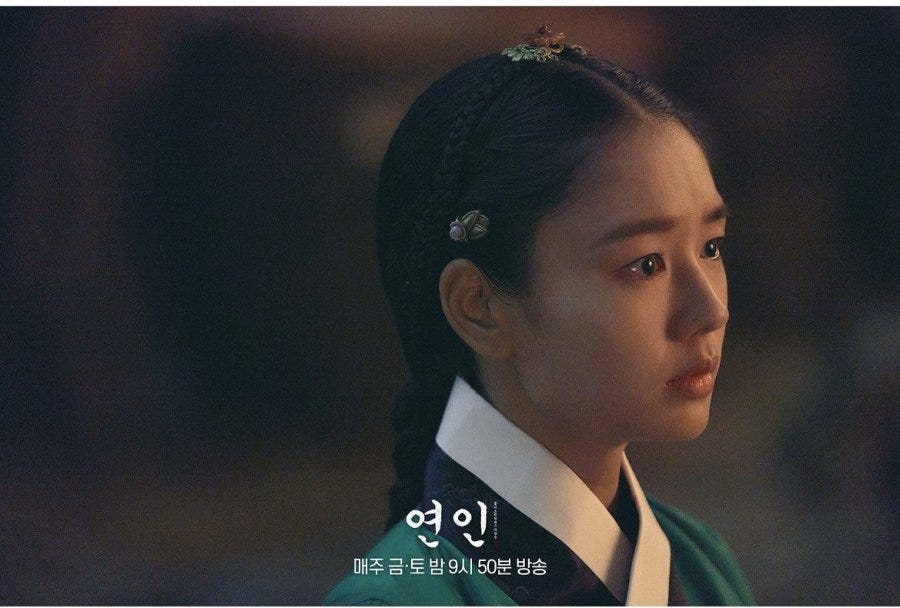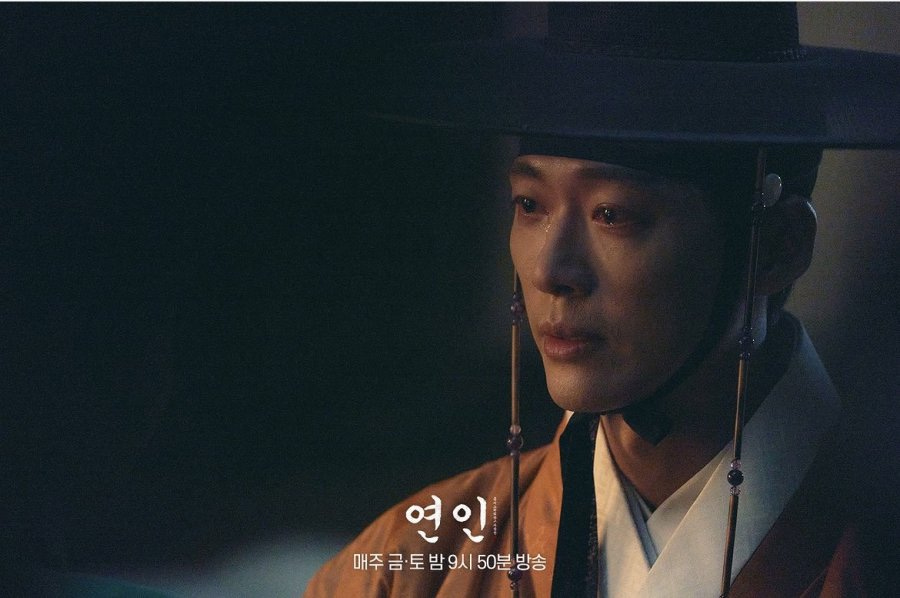My Dearest (2023) Episodes 7-10
A few weeks ago I picked up a more recent Korean history book and downloaded it onto my Kindle. Just for the fun of it. I wanted another contemporary Korean historical perspective even though Wikipedia has quite an informative article on the Qing invasion of Joseon. Still the book is a good read although it doesn’t go into great detail about the event. It confirmed a few general impressions I had about the background around the Manchurian invasion of 1636 that’s depicted in My Dearest.
In my podcast conversation with absoluteM about this show, I stated that one of the reasons I found the drama a compelling watch was not only because of its layered characterization but also for its vivid depiction of an honour and shame culture. It’s a modus operandi effective in controlling the populace — to shame them into lawful behaviour within the family and community without resorting to violence. It tends to be a hallmark of collectivist cultures. Individuals who assert their own identity outside of the group are immediately singled out for derision. When they do, they are made to feel their dislocation. It has served as an effective form of policing in many instances. Today we call it “cancellation”. In this particular scenario what the Manchurian invasion does is to strip bare the underlying weaknesses of building a society around shame — the glue that provides that social cohesion is weaponized against its staunchest adherents.
At the start of this story the palette is notably bright and colourful. The landscape is lush and the mood is festive. When war comes the joyful reds, yellows and pinks changes to brutish greys and browns. Where there was once an idyllic innocence with some harmless flirtation on the side — a utopia away from all the geopolitics of the world beyond the confines of their town. The only potentially destabilizing force to this community is socially unacceptable behavior like cavalier flirtations and an outsider with a philanderer’s reputation. This cannot last because Joseon is about to be refashioned by hostile external forces that have no regard for their way of life. Worse still, the entire country is wholly unprepared to deal with the onslaught of enemy forces on their doorstep.
The Manchurians may be the barbarians and villains to the people of Joseon as they become humiliated and subjugated. But the source of the rot goes far deeper. The pro-Ming policy of the government and that strict adherence to tradition unravels in the face of a Manchu victory. The king must leave his safe place and his crown prince must leave his home as hostage. For a people proud of its civilization and its Confucian mores to submit to barbarism, it’s a bitter pill to swallow. So how do they pick up the pieces while clinging on to those traditions? Certainly not without out-of-the-box thinkers or iconoclasts.
This is where Jeong-hyeon comes in and to a lesser extent Gil-chae. Jang-hyeon is the social outsider who disdains all aspects of the tradition that governs his compatriots. He eschews marriage and advocates serial relationships as a matter of preference. It’s an affectation that springs from a deep cynicism about the conventional wisdom of a world he scorns but doesn’t entirely reject. He reserves his bitterest venom for those in power but for the people he cares about he is willing to go the distance. This heterodox view of male-female relationships shocks even the shamelessly flirtatious Gil-chae who insists on marriage. Because she wants commitment, devotion and certainly like all peers, respectability. Her friendship with Eun-ae informs us that despite her claim that she’s in love with childhood friend Yeon-jun, it’s an obsession with an ideal rather than true love.
Although Yeon-jun seems a rigid traditionalist and a much touted goody-goody, he is just a creature with foibles as much as the next man. Aside from the fact that he’s a frustrating idealist strutting around on his high horse paying little heed to consequences for his family, he’s not above succumbing to temptation that Gil-chae poses on occasion. Clearly he likes her. His vanity is flattered by her attentions enough to dip his toes in now and again. It confuses her because she’s not stupid. She senses affection from him. But in his eyes she’s too wilful and unconventional to be a wife befitting an ambitious scholar desirous of going places. For a learned man from the bottom of the food chain seeking honour for his dearly departed mentors he can’t afford a wife that might bring them all shame with her outlandish behaviour.
Jang-hyun astutely observes all this and harbours resentment against Yeon-jun for wanting to take two bites at the cherry. Can’t a man be satisfied with one woman and let someone else have the other? But greed ails even the “best” of them. This resentment that his rival can’t stick to his guns is a seed that takes root in Jang-hyun. The resentment sprouts and festers because the woman he likes is blind to the subtle manipulations of his rival and deaf to the murmurings of her own heart. For her he would suffer the indignity of torture and the bloodshed on the battlefield but she would know nothing about them because he is too proud to blow his own trumpet. His honour as a cynic about the current state of Joseon under the leadership of Injo is at stake. He rejects the notion that he could be considered a “good” man or even a doer of good deeds because such a thing doesn’t exist.
Although he despises the incumbent ruler, he is intrigued by the son, the crown prince. Why? Does he feel sorry for the youngster who is a pawn in a larger game of divide and conquer? Or is there something else that stems from the mystery of his identity? Is he just a particularly savvy merchant? Or is there something in his past that’s yet to be revealed?
Meanwhile the Manchurians aim to dishearten the leadership of the country. It’s obvious that they understand their enemy better than the enemy understands them. Certainly the pride of the king wrestling with giving into the demands of their invaders is called into question. The invader knows that the shame will cause a fissure between the king and the crown prince. The pressure is on from all sides. Will the two men do what’s best for the nation? Resentment is the key so it’s Jang-hyeon to the rescue on multiple occasions. Not only does he go undercover because he can speak the lingo but he has the smarts to survive the suspicions of Hong Taiji and his minions.
The lack of preparation by Joseon against the Manchu invasion is in part due to factional politics within the court and in part due to the belief that their superior civilisation or alliance with a culturally superior power ie. Ming would put them in good stead against the barbarians. None of their expectations come to fruition. The common folk bear the brunt of bad policies and we’re told that young women take to suicide rather than live with the stigma of rape in their community. Historically those who choose life end up being shunned by their loved ones.
So how does all this impact the romance? Quite a bit actually. It affects timing for one and availability. Jang-hyeon is just not there for a lot of Gil-chae’s personal struggles after the invasion. On hindsight it’s a double-edged sword. He’s not there to hold her hand but having to struggle on her own means that she has to grow up fast to survive post-war turmoil. Over the few years she transforms into a savvy competent business woman feeding her nearest and dearest despite having to endure insults in those early days for stepping out. Through it all she thinks a lot about Jang-hyeon to get through them — what he would do in a particular situation and the ordeal of loneliness in trying to change her family’s fortunes. Completely unaware that he’s alive and trying to dodge swords here and there.
It isn’t just her of course. Most people are completely unaware of Jang-hyun’s contribution to the cessation of hostilities much less his plan to save Gil-chae from the Manchurians on the island. He makes a decision not to brag about it because he’s embarrassed that he sent her into danger (so he says) but I’m inclined to think that it goes against his pride — he hates being anyone’s hero. I too think that he’s not willing to suffer the indignity of waiting around for a woman to change her mind (or work out who she’s really in love with) so the adventurer in him thinks that absence might make the heart grow fonder.
So at the end of part 1, the romance is a non-starter. Though I could I’m not inclined to blame Ryang Eum despite him committing the terrible act of not setting the record straight — that reports of Jeong-hyun’s death were indeed premature. I don’t know why he thought he could get away with it but then perhaps he never thought he would. In all likelihood he just wanted her out of the way so that things would remain the same. Shamelessly possessive, he was evidently very much aware of how much Jeong-hyun liked her — it really wasn’t a fling like all the others — and it would change the status quo for him entirely.
In the end Gil-chae and Jang-hyun are their own worst enemies. Pride being the foremost culprit. It’s evident from their conversations — if you can call it that. He assumes the worst about her and goes on the attack. She still reeling from the shock of his undeadness retaliates with bad case of noble idiocy. He’s angry and hurt by what he perceives to be an act of betrayal. She is a woman torn by many obligations. Even while she used to flirt with the boys from her village she is still very much a woman of her time. She has always wanted lifelong commitment in the form of marriage. The burden of caring for a demented father, a younger sister and a very young brother has to fall on someone. She’s the oldest. Elopement can’t be an option. Another man has already offered marriage and protection that her family needs. The question she rightly asks is… where has Jeong-hyun been all this time?
The blame game is useless because in general there is no going back. There are no winners. But each character has agency and that comes with far-reaching consequences in this case. They can’t be together for all kinds of good reasons. At least not at this point in the narrative.





